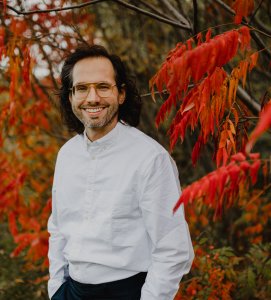Colin Weaver

Colin Weaver is a PhD Candidate on Religious and Environmental Ethics at the University of Chicago Divinity School. The Divinity School conducted an interview with him to honor Earth Month.
What does your work focus on?
In general, my research considers the ethical and political pitfalls that can attend how scholars and political institutions take up "environmental crisis" and "nature" as problematics. I am interested, for instance, in how the rhetoric of crisis often strives to transcend and thereby conceals (rather than engaging) social antagonisms, how conquest-era conceptions of Indigenous peoples are variously recast in settler environmental discussions, and how attempts to establish the intrinsic value of nature displace the myriad quotidian ways in which different people and nonhuman beings share life and death. My dissertation examines the imaginative habits of a strand of secular environmentalism that finds itself preoccupied with trying to transform the worldviews of its moral and political opponents. I consider how these would-be worldview-changers, or eco-conversionists, are animated by a certain anxiety over the bare existence of such opponents, whom they consistently cast as mere impediments to solving ecological crises. Drawing on a methodology that I derive from folks like Ludwig Wittgenstein and Cora Diamond, the project seeks to help such environmentalists imagine a future on an ecologically damaged planet where other people do not simply disappear but require encounter and negotiation.
How does the study of religion intersect or inform the study of environmental issues – or vice versa (how does thinking about the environment intersect or inform your study of religion?
These multidisciplinary fields intersect in numerous ways. I am particularly interested in how the tools from the study of religion can help us question the concepts, concerns, and imperatives of dominant forms of environmental thought and activism. For instance, American environmental rhetoric often unwittingly (and so uncritically) inherits a certain moralistic Protestant sensibility even as it construes all or most "religions," and especially conservative American Protestantism, as essentially anti-environmental. Those sorts of tensions should be explored and pressed on I think, and the tools from religious studies can help with those tasks.
What inspired your interest in the work you're currently pursuing, and what is next for you?
A certain concern for ecological problems (and animals) absolutely led me to my current work. At the same time, as I familiarized myself with environmental thought, I couldn't shake the sense that many environmental conversations were animated by the fact that other people did not see the world as environmentalists thought they should and that that divergence was a sign that other people are either depraved or silly. That last notion struck me as obviously false and rather convenient, leading me to examine how the others of mainstream environmentalism are constructed and how those constructions enable some scholars to deflect from the uncomfortable reality of other people.

